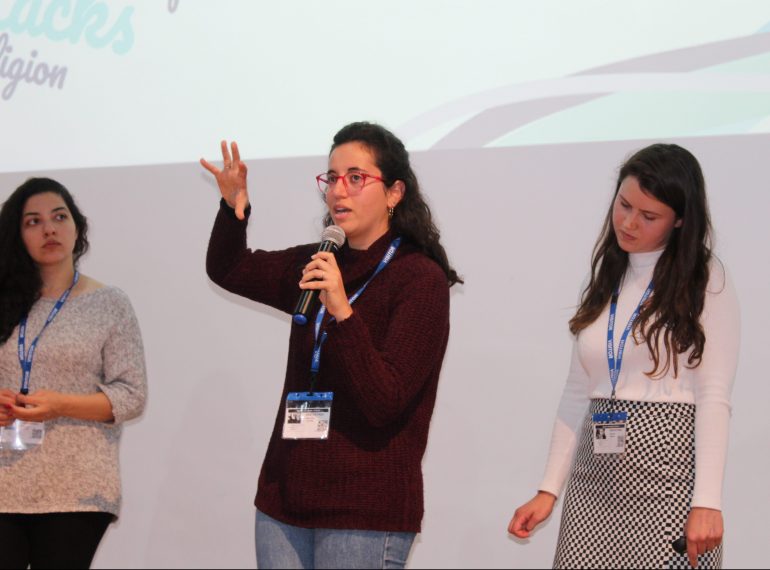
Younger pupils had the chance to explore one of the world’s most intractable conflicts when a Palestinian and an Israeli visited the School.
The two young women spoke during a Lower School Lecture Assembly led by the charitable organisation, Solutions Not Sides, which promotes open and positive engagement as the best approach to the long-running conflict.
Celia Hart, Outreach and Administration Manager for the organisation, introduced the session in the Shearly Hall, which was part of School’s lecture programme for Years 7–10 organised by Nisha Mayer, Head of Academic Enrichment. The boys heard from Rena, a Palestinian who grew up in Jerusalem, and from Tania, an Israeli from Tel Aviv. Both recalled vivid memories of childhood fears arising from the conflict, yet they were able now to agree about many aspects of what the way forward should be.
Headmaster Neil Enright said: “This was an engaging exploration of a very important, but often difficult, topic, with the two young women recalling experiences that are almost unimaginable for us in the UK, but were part of normal life for those growing up in the conflict.
“It was good for the boys to see how two people ostensibly on different ‘sides’ can work together. Although there was a clear sense that there is still some way to go, with divisions rooted in both communities, it was apparent that there is real hope things can be better for future generations. In today’s climate of polarised political debate, it is more crucial than ever that our pupils learn to consider the viewpoints of others and do not simply resort to tribalism.”
Rena remembered playing outside as a child and then fearing her mother was dead as bombs started going off around her and her friends. She recalled an Israeli soldier who pointed his loaded weapon at her in the street when she was outside during curfew.
For her part, Tania, who is finishing a Master’s degree in Educational Psychology, explained the system of compulsory military service for young Israelis – she served in Intelligence. She told the boys that the first time many young Israelis encounter a Palestinian is in this context, where they are viewed as hostile or enemies. As a child, the fear of suicide bombings was very real and limited some opportunities. There were regular bomb sirens, which gave people only 60 seconds to get to a shelter. She told an anecdote of how on one Holocaust Memorial Day, she mistook the siren sounded to mark the start of the period of reflection for a bomb siren and, startled, began running downstairs towards a shelter. When she realised it was a false alarm, she simultaneously laughed and cried.
Violence, said Tania, only adds fuel to the fire and cannot be the answer: “Israelis will only have a safe home when Palestinians have a safe home.”
Among the questions posed by the boys were:
- Would a single-state solution work? The visiting speakers answered that people were probably not ready; there was broader support for a two-state solution.
- How have foreign nations affected the conflict? The response was that there had been many impacts, and these had not always been helpful. Tania cited President Trump’s decision to move the US Embassy to Jerusalem as something which added to tensions. However, foreign support could have a positive impact if it focussed on supporting the leaders of both sides to find a way forward.
- What was the main cause of the conflict – perhaps Hitler’s régime and World War II, or the Crusades almost a thousand years before? In response, the speakers pointed to further causes, including the fact that the ‘Holy Land’ is just that for all three Abrahamic religions, and that the region’s geography makes the territory strategically important. Any solution would need to take many factors into account.
- How had other young people of the two women’s generation viewed the situation growing up and had they taken sides? Yes, many Israelis viewed Palestinians as the enemy, never knowing them as children, said Tania. The conflict is very deep-seated, with hatred and fear common. Many Palestinians saw Israelis as soldiers and machines, not as people, Rena said. But, she added, people could get beyond that if they tried to understand others and reach out to them. The two speakers were clear that they didn’t view each other negatively.
